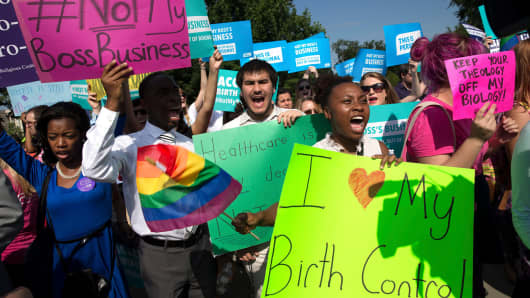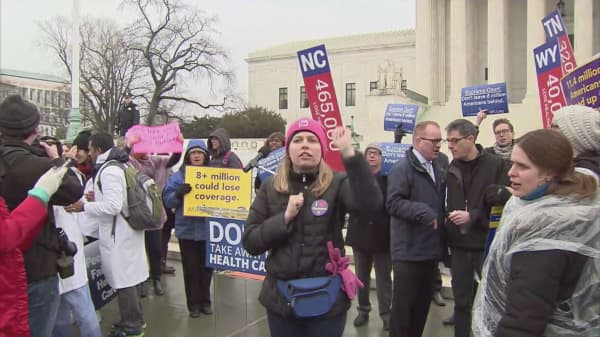The new regulations downplay the importance of birth control as a women's health service. In 2011, the Institute of Medicine recommended that birth control be included as one of ten women's preventive services that all new health-insurance plans must cover without cost-sharing. Birth control was included on the list of preventive services because it is a health service used by women that can improve health and prevent poor health outcomes. Birth control allows women to plan their pregnancies which includes healthy spacing between pregnancies. Spacing pregnancies improves the health of women and babies. Planning pregnancies allow women to partake of important prenatal care that can improve the health of their pregnancy. There are also women who take birth control because they are unable to carry a pregnancy to term and the birth control effectively prevents further miscarriages. Some women have medical conditions that would put their health at risk if they become pregnant. In addition, many women use birth control to treat medical conditions, such as polycystic ovary syndrome or severe cramps. Oral birth control also lowers the risk of ovarian cancer.
Instead of highlighting these important health benefits, the preamble of the rules questions the medical benefits of access to birth control. Most strikingly, there is a statement that requiring coverage of the birth could "affect risky sexual behavior in a negative way" in young women and teenagers covered by the plans. Research shows this is simply not true. By placing this statement into a discussion of the medical benefits of birth control, the administration is undermining the importance of birth control as a health service and instead redirecting attention to sexual activity. It is basically equating birth control with sex rather than with health care.
The result is discrimination. The rules allow employers and schools to exclude just one type of service, and that service is used only by women. A vaccine denier cannot exclude coverage for vaccines in her employee's health plan because she thinks vaccines are immoral (nor should she). A college cannot exclude substance use treatment from the student health plan because the administration believes the underlying use of alcohol or drugs is immoral (nor should they). Allowing a moral objection also opens the door for all kinds of discriminatory intentions couched in language of morality. Our nondiscrimination laws exist in large part to protect people against moral beliefs.
There have already been two states and four organizations announcing legal challenges will be filed against the new birth control exemptions. There is a good chance the courts will find these regulations overstepped federal law, both in the administrative process and in allowing sex discrimination. But just the issuing of the regulations is damaging to women because our government has placed women's health needs secondary to others' moral beliefs.
Birth control is a vital health service for women. Instead of helping women access health care, the administration is downplaying the importance of women's health and allowing companies and schools to withhold access to care because of their own moral judgments. In the end, women will be discriminated against and lose access to affordable birth control.
Commentary by Dania Palanker, an assistant research professor at the Center on Health Insurance Reforms at Georgetown University. Follow her on Twitter @DaniaPalanker.
For more insight from CNBC contributors, follow @CNBCopinion on Twitter.




